













|
 |
 |
| |
|
 E-mail
to a Friend
E-mail
to a Friend
 Printer Friendly
Printer Friendly |
|
| |
|
|
|
| |
|
New
DNP Degree
Three
faculty members enroll at MCG
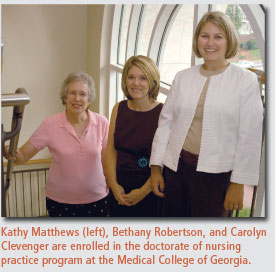
 hanks
to a collaboration between Emory and the Medical College of Georgia
(MCG), three School of Nursing faculty members are on their way
to completing their doctorates of nursing practice (DNP). Launched
last year, the MCG's DNP aims to develop clinical leaders
and experts in nursing practice. The program strives to increase
advanced competency in clinical, faculty, and leadership roles;
increase knowledge to improve practice and patient outcomes; and
increase the number of clinical faculty.
hanks
to a collaboration between Emory and the Medical College of Georgia
(MCG), three School of Nursing faculty members are on their way
to completing their doctorates of nursing practice (DNP). Launched
last year, the MCG's DNP aims to develop clinical leaders
and experts in nursing practice. The program strives to increase
advanced competency in clinical, faculty, and leadership roles;
increase knowledge to improve practice and patient outcomes; and
increase the number of clinical faculty.
Carolyn Clevenger, a gerontological
nurse practitioner, was interested in the DNP even before the program
began. When a grant from the Robert W. Woodruff Health Sciences
Center Fund became available to support Emory faculty interested
in the DNP, Clevenger was thrilled. "I thought it was a wonderful
opportunity to do something that I had been investigating for a
year prior to that. I'll still be a nurse practitioner, but
the program has forced me to think about situations very differently.
It has given me a different skill set, not a career change."
Because of the rapid changes in health
care and the need to implement the latest and most effective practice
standards, both academic and nonacademic health care providers are
recognizing the importance of terminal professional degrees that
focus on the practice of health sciences, as opposed to the science
behind the practice.
Although
nursing schools will still offer master's programs, they will
likely be redesigned to prepare generalists for the changing health
care system.
As certified nurse-midwife Bethany Robertson explains, there is
currently a national movement to admit master's-level nurses
to DNP programs. But by 2015, nurses seeking advanced degrees will
move directly from the BSN into the DNP. This change parallels another
national trend that encourages nurses who are interested in research
to enter a PhD program immediately after receiving a BSN. Both of
these trends will mean more PhD- and DNP- prepared nurses will be
able to teach, lead, and conduct research with much of their careers
ahead of them.
Robertson
chose to pursue the DNP "because I saw this wonderful body
of knowledge generated by nursing researchers, and it hadn't
been translated to the clinical arena. I'm now learning to
apply that."
She
is currently studying how communication standards can affect patient
outcomes in the delivery room. "They're not going to
teach me more about delivering babies or doing an episiotomy than
I already know," she says. "This program addresses a
much broader context of health care—how nurses and physicians,
and all of the partners in a health care team, can improve patient
outcomes."
For
family nurse practitioner Kathy Matthews, the program's goals
have already bolstered her quest to improve patient outcomes for
those who suffer from a combination of chronic illnesses. Matthews
says the program has helped her delve deeper into the management
of chronic diseases. "It isn't just about increasing
the content knowledge, it's really about increasing communication
skills, process skills, and critical thinking." She is working
toward evaluating an intervention program for patients with diabetes
to learn if treating depressive symptoms in those patients improves
not only their mental health but also their physical health.
All
three faculty members emphasize the vital importance of the DNP's
emphasis on keeping up with the latest research. "You have
to stay connected to the evidence. It changes every day,"
says Robertson. "That's part of the skills they're
giving us in this program—how to stay connected to the literature
so that you can be at the penetrating point of evidence-based practice
and models of care. That is the charge they're giving us."
|
 |
| |
|
|
|
| |
|
|
|
 |
|
Support
for Cancer Patients
Study
targets older African Americans
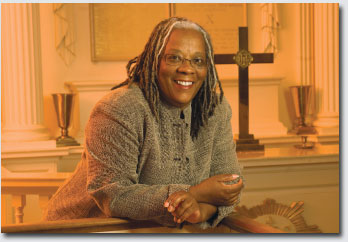
 ears
ago while working as a critical care nurse, Dr. Jill Hamilton noticed
that patients who were more easily weaned from ventilators had something
in common: support from family and friends. Hamilton says the same
idea holds true for cancer patients. Support from family and friends
is crucial. But the type of support patients need differs from culture
to culture, and this difference is often overlooked. That's
why the National Institutes of Health (NIH) has awarded Hamilton,
a Georgia Cancer Coalition Distinguished Cancer Scholar, a three-year
grant to study support networks and coping strategies for older
cancer patients within African American families and communities.
ears
ago while working as a critical care nurse, Dr. Jill Hamilton noticed
that patients who were more easily weaned from ventilators had something
in common: support from family and friends. Hamilton says the same
idea holds true for cancer patients. Support from family and friends
is crucial. But the type of support patients need differs from culture
to culture, and this difference is often overlooked. That's
why the National Institutes of Health (NIH) has awarded Hamilton,
a Georgia Cancer Coalition Distinguished Cancer Scholar, a three-year
grant to study support networks and coping strategies for older
cancer patients within African American families and communities.
To study this population, Hamilton
has created a questionnaire developed from in-depth interviews she
conducted during the past 10 years with older African American breast
cancer and prostate cancer patients. The questionnaire focuses on
the distinctive coping strategies and types of support these patients
use to deal with their illness. For example, previous questionnaires
asked whether a breast cancer patient participates in a support
group, and she may answer no. However, this same patient may receive
valuable support from the church, historically a cornerstone of
the African American community.
Yet
even if patients receive support from their church, they may be
reluctant to talk freely with others about their worries and fears.
But talking could be just what they need. "Older African Americans
have been socialized to be strong, to be stoic," says Hamilton.
"If you're very spiritual, very religious, and you talk
about being sick, it goes against your faith. Because the first
thing you're supposed to do when you're sick is have
faith that God will take care of it. Talking about being sick may
give the appearance that one is weak, which makes older African
Americans reluctant to talk to their minister or to the people around
them about their fears and doubts. You have to give these patients
a safe place to go."
Where
that safe place is Hamilton does not yet know. But one thing she
does know is that many older African American patients worry about
being "cast aside." They want to stay as active as possible,
whether taking care of grandchildren, teaching classes at their
church, or teaching others what they have learned about cancer.
"These things take their minds off their illness, but most
of all they want to feel needed," says Hamilton.
The
ultimate goal of her study is to develop a coping questionnaire
that will be useful in practice and help others understand what
the patient needs. "It may not prolong their life or help
with the severity of the illness, but it may make them feel good
about themselves and the people around them," says Hamilton.
"You know that if they're feeling good about themselves,
they're going to be more motivated to endure treatments. It'll
make them more motivated to do what they need to do to survive."
|
|
| |
|
|
|
| |
|
|
|
| |
|
A
Leader in Nursing Education
Lewis
named associate dean
 he
School of Nursing has named a new leader intent on helping the school
fulfill its goal of becoming the best in education. Dr. Marsha Lewis
now serves as associate dean for education.
he
School of Nursing has named a new leader intent on helping the school
fulfill its goal of becoming the best in education. Dr. Marsha Lewis
now serves as associate dean for education.
Lewis comes to Emory from the University
of Minnesota School of Nursing, where she directed the school's
graduate programs and focused her research on interventions for
family caregivers of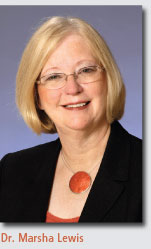 persons with dementia. In 2003, Lewis was honored as best director
of graduate studies at the University of Minnesota. Among her colleagues
is Dr. Kenneth Hepburn, associate dean for research, who held a
similar position at Minnesota's School of Nursing until he
joined Emory earlier this year.
persons with dementia. In 2003, Lewis was honored as best director
of graduate studies at the University of Minnesota. Among her colleagues
is Dr. Kenneth Hepburn, associate dean for research, who held a
similar position at Minnesota's School of Nursing until he
joined Emory earlier this year.
"I
was drawn to the associate dean for education position because it
is meant to celebrate and take the educational mission of the school
to new heights," says Lewis, "and because of the school's
commitment to equally valuing both the education and research missions."
In
her new role as associate dean, Lewis is concentrating on collaborating
with administration, faculty, staff, students, and the community
to fulfill the school's potential—providing the best
education for nurses, creating new knowledge, and serving the school's
constituencies across the globe. "Although I have a major
responsibility for promoting a culture that fosters and nourishes
the educational mission, all missions of the school are interdependent,"
says Lewis. "This makes the role particularly exciting for
me."
For
the past three years, Lewis served on the Board of Commissioners
for the Commission on Collegiate Nursing Education (CCNE) and its
Accreditation Review Committee. "My experiences with CCNE
accreditation have provided me with the tools to guide program and
strategic planning and continuous quality improvement," says
Lewis. "It has also given me a wealth of knowledge regarding
creative and innovative means to launch the nursing school into
new dimensions of excellence." |
|
| |
|
|
|
| |
|
|
|
| |
|
|
|
 |
|
| |
Growing Interdisciplinary Science
Donaldson
bridges nursing and medicine
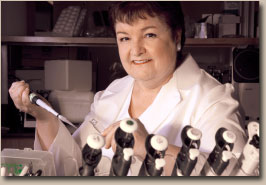
 r.
Sue Donaldson has joined Emory as Distinguished Professor
of Nursing and Interdisciplinary Science. In this newly
created position, Donaldson holds a primary appointment
in the School of Nursing and a secondary appointment with
the Department of Physiology in the School of Medicine.
r.
Sue Donaldson has joined Emory as Distinguished Professor
of Nursing and Interdisciplinary Science. In this newly
created position, Donaldson holds a primary appointment
in the School of Nursing and a secondary appointment with
the Department of Physiology in the School of Medicine.
With a research background
in physiology, nursing, and patient care, Donaldson collaborates
with Dr. Marsha Lewis, associate dean for education, and
Dr. Kenneth Hepburn, associate dean for research, to advance
interdisciplinary training and research opportunities in
the basic sciences for nurses. She also fosters interdisciplinary
research among the nursing and medical schools and the basic
sciences. Specifically, Donaldson will head a new initiative,
"Transforming Nursing's Engagement in Science,"
which seeks to advance nursing as an interdisciplinary and
collaborative field with other health sciences, basic sciences,
and biomedical engineering.
"I
look forward to collaborating with my Emory colleagues to
facilitate and develop interdisciplinary science programs
across university divisions," says Donaldson. "This
is a wonderful opportunity to use the resources from this
institution to prepare the very finest scientists to address
health care issues and problems."
Donaldson
is one of an elite corps of nurses who have been elected
to the Institute of Medicine and has received numerous honors
and nursing awards. Prior to joining Emory, she was
a professor in both the schools of nursing and medicine
at Johns Hopkins University and served there as dean of
nursing for seven years. As dean, Donaldson created the
infrastructure needed to support the school's developing
research program and implemented its first doctoral programs.
|
|
| |
|
|
|
|
| |
|
|
|
| |
|
|
|
| |
|
A
Hero to Women and Children
Business
newspaper honors nurse-midwife
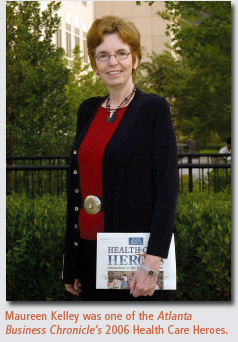
 r.
Maureen Kelley has been bringing babies into the world for more
than 20 years. As a practicing certified nurse-midwife, she has
cared for hundreds of women and children, from as far away as Moscow
to as close as midtown Atlanta. Late last spring, the Atlanta
Business Chronicle named Kelley a Health Care Hero for her
lifetime commitment to maternal and infant health. r.
Maureen Kelley has been bringing babies into the world for more
than 20 years. As a practicing certified nurse-midwife, she has
cared for hundreds of women and children, from as far away as Moscow
to as close as midtown Atlanta. Late last spring, the Atlanta
Business Chronicle named Kelley a Health Care Hero for her
lifetime commitment to maternal and infant health.
Kelley, who received the honor in
the allied health category, is a clinical associate professor in
the School of Nursing, where she holds the Independence Chair of
Nursing and serves as chair of the Department of Family and Community
Nursing.
"It
was a tremendous honor to have been recognized in this way,"
says Kelley. "It is a privilege to be given the extraordinary
opportunities I have had and to be able to work with people all
over the world who are committed to the same goal of making people
healthy. I could not be where I am today without the support, mentoring,
and caring of the people I have worked with. This award is truly
an honor to them."
As
part of a team that travels to the Caribbean, Kelley is collaborating
with Dean Marla Salmon to create a centralized accreditation and
certification mechanism for midwives throughout the region and to
help midwives improve care for mothers and babies. Kelley is also
a collaborator on the Balashikha Project, based just outside of
Moscow. The project, which helps establish centers for perinatal
care and high-risk mothers and babies, already has improved the
reproductive health of women in Russia.
At
home in Atlanta, Kelley formerly directed the midwifery program
at Emory Crawford Long Hospital. It's there she launched the
Centering Pregnancy program. It provides a group approach to prenatal
care, combining three essential elements of care—health assessment,
education, and support—that every pregnant woman needs.
"I
have been inspired by Maureen and her unflagging dedication to help
the people she serves," says Salmon. "She is crystal
clear on her devotion to healthy moms, healthy babies, and healthy
families. We can get lost in a variety of things that seem important
and lose sight of what really is important, and she never loses
track of that." |
|
| |
|
|
|
| |
|
|
|
 |
|
| |
|
|
| |
By
the Numbers
Fall
enrollment reflects varied backgrounds
 n fall 2006, the School of Nursing welcomed it largest class
yet, with 106 incoming juniors. The school also enrolled 88
new MSN students and three new PhD students. As in recent
years, the students have a variety of backgrounds and interests.
Almost 40% of new BSN students are pursuing nursing as their
second degree, with first degrees ranging from biology to
anthropology to dance. Juniors range in age from 19 to 57,
and new master's students from 22 to 63.
n fall 2006, the School of Nursing welcomed it largest class
yet, with 106 incoming juniors. The school also enrolled 88
new MSN students and three new PhD students. As in recent
years, the students have a variety of backgrounds and interests.
Almost 40% of new BSN students are pursuing nursing as their
second degree, with first degrees ranging from biology to
anthropology to dance. Juniors range in age from 19 to 57,
and new master's students from 22 to 63. |
|
| |
|
|
|
 |
| |
|
|
|
| |
|
|
|
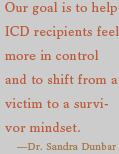
 |
|
Accentuate
the Positive
PEACE
trial helps patients cope with ICDs
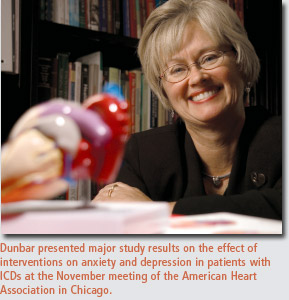
 mplanted
cardiac defibrillators (ICDs) can shock irregular hearts back to
normal rhythms. But they can also deliver a jolt to patients'
psyches when the lifesaving devices discharge their voltage. Apprehension
over if or when a jolt will come often leads to anxiety, fear, and
depression in some patients. mplanted
cardiac defibrillators (ICDs) can shock irregular hearts back to
normal rhythms. But they can also deliver a jolt to patients'
psyches when the lifesaving devices discharge their voltage. Apprehension
over if or when a jolt will come often leads to anxiety, fear, and
depression in some patients.
Dr. Sandra Dunbar, the Charles Howard
Candler Professor of Cardiovascular Nursing, hopes to reduce the
emotional side effects of living with an ICD. Her Psychoeducational
Intervention in Internal Cardiac Defibrillator Patients (PEACE)
trial was designed to improve physical and emotional recovery 12
months after initial ICD implantation.
Specifically,
the PEACE trial examined whether educational and psychological intervention
affects arrhythmic events in patients with ICDs. If patients learn
ways to reduce anxiety, fear, and depression, can the frequency
and severity of the events be reduced?
Dunbar
says that during the weeks following implantation, ICD patients
are usually keenly aware of the new implant, which is inserted in
the pectoral area and is slightly larger than a pacemaker. In addition
to psychological effects that come with having an ICD, patients
may experience pain, sleep difficulties, and limited arm movement.
However, these side effects tend to subside after the first six
weeks.
The
PEACE trial divided patients, ages 25 to 79, into three groups.
One group received education and counseling in group sessions, another
received education and counseling via telephone consultations, and
a control group received standard care from their providers. Counseling
sessions focused on positive self-appraisal and proactive coping
skills, such as seeking social support from family and friends,
resuming activities they enjoy, and turning negative thoughts about
their health into constructive ones.
"The
group intervention sessions were interesting because the patients
shared their experiences in detail," says Dunbar. "The
telephone sessions also were informative, and patients received
individual assistance in a convenient, cost-effective manner.
"Our
goal is to help ICD recipients feel more in control and to shift
from a victim to a survivor mindset," she adds.
Study
results to date show the interventions were effective in increasing
the use of positive coping strategies and patients' perception
of the device as nonthreatening. Those groups receiving the interventions
had fewer days on disability and made fewer calls to their health
care providers at the one-year follow-up mark. Trends in gender
differences were also found. Women experienced greater anxiety and
depression and less perceived social support over the course of
the year than men.
Dunbar
hopes that further analysis of the data will help identify those
patients for which the intervention will be most beneficial. |
 |
| |
|
|
|
| |
|
|
|
|
|
Prescriptive
Authority
Georgia
law awaits implementation
 ore than a decade ago, Georgia's advanced practice nurses
(APRNs) and their supporters began working for the right to prescribe
medications to patients. Last spring, Gov. Sonny Perdue signed SB480
into law, which expands the authority of APRNs by allowing them
to write prescriptions. Previously, APRNs could only call in prescriptions
to pharmacists.
ore than a decade ago, Georgia's advanced practice nurses
(APRNs) and their supporters began working for the right to prescribe
medications to patients. Last spring, Gov. Sonny Perdue signed SB480
into law, which expands the authority of APRNs by allowing them
to write prescriptions. Previously, APRNs could only call in prescriptions
to pharmacists.
But the law, scheduled to go into
effect this past July, has yet to move forward. Since the bill was
signed, Georgia's Composite State Board of Medical Examiners
has proposed rules and regulations for implementing the law. And
there is concern among the law's supporters that the board's
rules and regulations may be too restrictive, impractical, and costly,
in effect, overstepping the law's intent.
Before the law was passed, Georgia
was the only state that did not grant APRNs—nurse practitioners,
nurse-midwives, nurse anesthetists, and psychiatric/mental health
nurses—full prescriptive authority. Such authority would allow
nurses to prescribe medications to treat common illnesses such as
colds; chronic illnesses such as diabetes; and mental illnesses
such as anxiety. All prescriptions would be written in accordance
with protocols established by the nurse and the collaborating physician.
Emory and the Woodruff Health Sciences
Center were among those working behind the scenes to move the legislation
forward. Emory nursing dean Marla Salmon and Lucy Marion, dean of
nursing at the Medical College of Georgia, met with key legislators
to advocate for passage of the law, as did Linda Womack, director
of state affairs for Emory. Maureen Kelley, chair of the Department
of Family and Community Nursing, testified before a House subcommittee
in support of the bill. Wright Caughman, director of The Emory Clinic,
also visited the legislature to express support for the bill on
behalf of the Clinic and Emory physician leaders. Last but not least,
Health Sciences Center CEO Michael Johns, School of Medicine Dean
Thomas Lawley, and Dean Salmon sent a joint letter of support to
every member of the Georgia House and Senate.
Proponents of the law say the idea
behind it is to increase access to health care for underserved populatons.
It will also save time for patients, nurses, and physicians by streamlining
the prescription process, as well as deliver more effective treatment
to patients in rural areas where there are few doctors. Opponents
state that granting full prescriptive authority to APRNs will reduce
patient safety and physician oversight and increase the risk of
medical liability.
Yet most APRNs say they are not looking
for completely independent prescriptive authority. "We don't
want to be physicians," says Madge Donnellan, associate professor
in the School of Nursing. "We don't want that scope
of practice. What we want is to be authorized to be able to fully
practice within our scope of practice, which is well delineated
in this country for every specialty in nursing. There are no data
to show that it is unsafe when nurses get prescriptive authority."
The Georgia Nurses Association is
pursuing additional legislation in the legislative session in progress
at press time to counteract the new requirements.
|
|
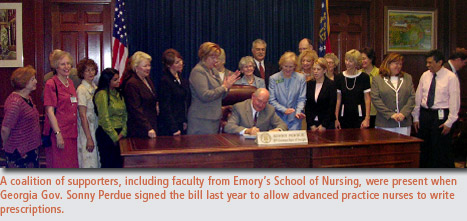 |
| |
|
|
| |
|
|
|
|
|
|









